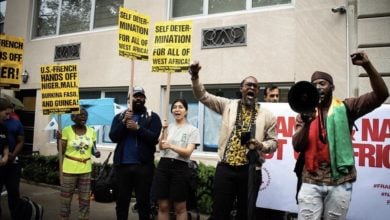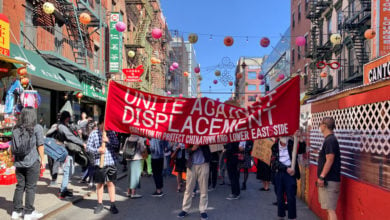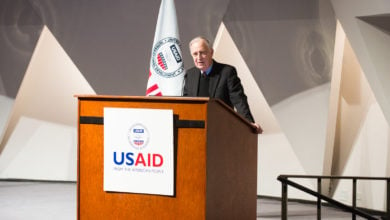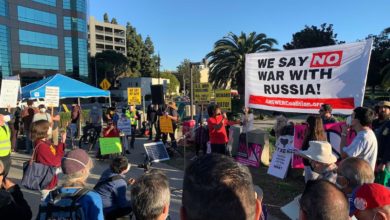 Ramsey Clark in Samarra, Iraq inspecting a pharmaceutical plant rendered inoperative due to sanctions, 1996. Photo: Bill Hackwell |
The official U.S. policy toward Iraq has been “regime change” since 1998. This started with the Clinton administration after it forced U.S. weapons inspectors to leave the country and then bombed Iraq in Operation Desert Fox in December 1998. The bombing continued on an almost daily basis all the way up to the “Shock and Awe” invasion of March 20, 2003. Why have three successive U.S. administrations pursued a policy of extreme hostility toward Iraq?
We shouldn’t be surprised that U.S. policy toward Iraq remained the same through the administrations of George H.W. Bush, Bill Clinton and George W. Bush because each administration was pursuing the interests of major economic interests within the United States. These interests desired a very strong commitment to dominate the region, Iraq and beyond, and exploitation of its resources and people.
People have this idea that things will be different when administrations change, but when you look at U.S. foreign policy, it’s been pretty constant in its basic motivations since before President James Monroe announced his doctrine in 1823. The United States has had a foreign policy which benefits economic wealth and power inside the country.
When the Shah of Iran fell in 1979, the United States suffered a big defeat in the region. The Shah had a powerful presence. He had a huge army and sophisticated weaponry. He bought $26 billion in U.S. arms between 1972 and 1976. The Shah systematically repressed his own people and the Kurdish people as well.
Iran was a staging ground for U.S. industry. The Shah allowed all kinds of assembly plants in Iran, including Bell Helicopter and dozens of other major U.S. corporations. He used these not only for Iran’s military, but for economic sales and distribution, and domination of neighboring states.
When the Shah fell, the U.S. government lost its enforcer in the region. At the time, there weren’t obvious alternatives that were easy to establish. Then, the Soviets reinforced their military presence that had come into Afghanistan over a period of decades. This showed their relationship with the Afghan government. In response, the U.S. government called the Soviet presence an invasion and built an insurgency.
The government also saw new opportunities to reestablish domination of the region. Iraq became the new center point. Iran, of course, was better situated than Iraq from every standpoint—much larger, much more powerful and richer—but it was gone and irretrievable for the foreseeable future. Turkey was not suitable for many reasons. Next to Iran, Iraq was the largest and most powerful country in the Gulf region.
The United States toyed with the idea of seeing whether Saddam Hussein could be its new servant. But they found that he wasn’t sufficiently compliant. He wouldn’t do what the government wanted him to do. He was not reliable to carry out U.S. wishes.
The main U.S. commitment was to have an operational base in the area. There was pressure on the military bases in Saudi Arabia—which is a very fragile government—from people that deeply resented U.S. military presence on their soil.
The American presence in Saudi Arabia tended to foment religious opposition, to feed religious unity against the United States. The U.S. government needed to establish something that would assure its military and economic domination of the region.
The focus became Iraq. Oil was a major factor. Israel was a factor. But the U.S. had learned from its experience in Vietnam that it can be extremely difficult to establish control and crush opposition in a country like Iraq.
I think the U.S. government knew it could defeat Iraq militarily in 1991 with minimum casualties. But it resisted occupation, although there were many elements in the government that pushed hard and wanted it. The leadership was concerned that an occupation could spin out of control.
The George W. Bush administration made the military invasion of Iraq and the destruction of the government its very top priority. What accounts for the change in orientation?
U.S. policy didn’t really waver significantly from before sanctions were imposed on Aug. 6, 1990, until “Shock and Awe.” It was a policy of maximum pressure to debilitate the country by sanctions and systematic bombing so thoroughly that the country would finally collapse, and then the military would come in.
During the 1990s, the U.S. government kept hammering away at Iraq and kept sanctions as tight as it could. But it never invaded. It’s hard to believe that Clinton would have created circumstances to justify an invasion because he relied on people who thought it was too dangerous to go all-out.
Bush came in and I think he had a lesser estimate of the presidency. He is not a cautious type of person. He never batted an eye when he executed 152 people as governor of Texas. He probably never thought twice about it, before or after the executions.
Bush brought around him Cheney and a whole group of ideologues who are much more radical in their approach to achieving domination. They are considerably less informed about the realities in Iraq.
The U.S. government saw Sept. 11, 2001, as the opportunity to exploit fear in a way that would eliminate, or at least greatly lessen, any opposition to extreme measures, like wars of aggression, disappearances, executions, assassinations and torture. They kept maneuvering until they could use the “threat” of Iraq’s weapons of mass destruction, fear, and a combination of lesser things as a justification to achieve their real interests.
Their interests were what all the previous administrations had been working for and essentially achieved. They did this by neutralizing the capacity for the region to resist their domination.
The U.S. waged a war of aggression without batting an eye. Since then, we’ve seen the disintegration of the conditions in Iraq and tremendous economic loss in terms of military expenditures, deaths and destruction.
Several ideas are woven through what I said. One that I think is really important is the need to recognize that different administrations have rarely altered U.S. policy. And when they have done so, the changes have only been temporary and moderate.
During the sanctions period, the United States accepted the UN-administered “Oil-for-Food” program. Some people assert that this proved U.S. policy was not targeting the Iraqi people, just the Iraqi government. Did the program benefit Iraqis?
The United States profited significantly from the oil in Iraq even before it invaded in 2003.
The cruelty with which the United States handled the genocidal sanctions and the hypocrisy of the “Oil-for-Food” program is something that really needs to be carefully examined. The U.S. government resisted the “Oil-for-Food” program as long as it could, because it restrained the government from crushing Iraq completely through unrestrained sanctions.
It resisted until it concluded that the cost of the growing international awareness of the cruelty and deadliness of the sanctions was more than it wanted to incur. It realized that the “Oil-for Food” program was the only means to actually continue the sanctions. This is what the U.S. government really wanted.
The payments by the “Oil-for-Food” program were a farce. Iraq was getting less than half of the revenues for its oil sales. It was severely limited in what it could buy and who it could buy from. The United States had enormous control over Iraq’s economy and over who it profited from the sale of its oil.
For those reasons, many of us argued against the inhumane sanctions. We saw the children dying. We urged against acceptance of “Oil-for-Food” because we saw it as a means of manipulation.
 Sanctions killed over 500,000 children under the age of five in Iraq. Photo: Bill Hackwell |
In spite of the debilitating sanctions, the Iraqis were remarkably successful. They were able to equalize the distribution of minimum food requirements.
They distributed around 1600 calories a day to everyone. This was accomplished by monopolizing government power over basic subsistence foods, like grain and other essential items.
This was an improvement, but the poor had great difficulty supplementing the rations. Even those who sold fresh fruit and vegetables in the market couldn’t afford what they were selling. People with more means, however, could supplement the distributions with meats, fish and other things.
The availability of medicine in 1998 to 2002 was much better than it had been in 1991 to 1997. But there were still terrible shortages. This was starkly different from the care available in the recent past. Before the first Gulf War, Iraqis had a free health care system.
Iraqi doctors are smart and well trained. By 1998, they were performing more medical services, in part, due to ingenuity. The ingenuity of the doctors seemed to be endless. Yet, doctors and health care professionals still constantly had to make difficult, terrible decisions. Because of the shortages of medicine, they often had to prioritize which patients to treat and which ones not to.
Infant mortality was much higher than before the Gulf War and it was still rising. It was five to seven times higher than in 1989, which is a calamity. The percentage of live births that weighed below two kilos continued to rise through 2002. It reached an all time high of 25 percent, whereas, before the sanctions it was under four percent.
Was it the working class and poor in Iraq who suffered most under the sanctions?
Yes. For them, there was no improvement because of the genocidal impact of sanctions. Under the sanctions, 90 to 95 percent of the population suffered greatly.
But even those with the most access to medicine and nutrition suffered. It is not as though one out of four children was born under 2.2 kilos and all the rest were big healthy babies of four kilos or more. Problems like infant mortality went almost all the way to the top of society. Children were the real victims. Those who did not die at or soon after birth had a weaker body, weaker organs and shorter life expectancy.
And the general quality of life plummeted for all. Problems with air, water, sanitation and other areas reached even the wealthiest Iraqis to some degree. The impact of the sanctions really hit the whole nation disastrously.
Things were still very bad in 2002, but it did seem better in some ways. The people were satisfied with what the government was doing to help with food and other necessities.
One thing we never found was anyone who thought they had been cheated on their rations. That’s really quite amazing. You didn’t find any protest. No one complained that they did not receive their fair rations. It was fact that they were getting theirs. This was a nationwide plan that included every human being in Iraq.
The only surplus that was available for merchants was that they could sell five percent of the foods they delivered for their own personal gain. Aside from that small amount, the government had a monopoly on all of it. That doesn’t mean you couldn’t bring something in your car or have something flown in to you if you where rich. But the significance of that was very minor.
You wrote an article that appeared in the Los Angeles Times on January 20, 2005. It explains why you agreed to be part of the legal defense team for Saddam Hussein. You state that “The defense of such a case is a challenge of great importance to truth, the rule of law and peace.” Can you explain your motivation for joining the defense team and the biggest challenges facing it?
I think the most important thing is that the American people have the capacity to affect, to some degree, the conduct of the government, to understand the importance of a fair trial and how much depends on it. It doesn’t really matter why a lawyer takes a case. Lawyers take cases; that’s what they do.
But here, not to take every possible effort to assure a fair trial, in fact and in appearance, is a historic mistake. This case shows that, at the level of legal justice, the government of the United States is not willing to be fair. It will destroy you, initiate an unbearable period of cruel and unusual punishment, and it will execute you.
This becomes fundamental to any hope for the integrity of the government. Without a fair trial, the truth will be destroyed.
A fair trial will provide the parties involved with the opportunity to present evidence related to the charges against them. If defendants have a fair opportunity and present evidence, it will be part of the record. Not only will they be judged on that record, but those who prosecute or persecute will be judged on that record, too.
And to a very considerable degree, the psychology of the people in the United States is that if you are convicted you are guilty, period. They might have thought you were guilty before. If you are acquitted, they may still think you are guilty. But if you are convicted, then they don’t have to think about it anymore. That is beyond argument; it is established. That’s why truth is so important.
Here you have a court that is an Iraqi special tribunal, essentially created by the United States. You have the pictures of the victim right after his arrest with his mouth open and people probing into it. He looked disheveled and perhaps disoriented or worse.
This is a continuation of the demonization of the person, treating him like an animal. My office got eight or 10 calls from people in the Native American community saying that is the way they treated Crazy Horse, Sitting Bull and Geronimo, making them look like animals, unworthy of being considered humans.
Then, you have a picture of Ahmed Chalabi towering over Saddam Hussein on December 18, 2003. It was apparently taken in his jail cell. It’s a bare place. I think I’ve seen pictures of President Bush on the wall behind him.
Less than one week after his capture, Chalabi is towering over him. How did Chalabi get in there? Who wanted that picture to get out?
Chalabi’s nephew was appointed to run the court to try Saddam Hussein. How can there even be the appearance of fairness under those circumstances? Chalabi’s nephew had gone to Iraq as a lawyer who had been a law partner of current Under Secretary of Defense Douglass Feith. The two were trying to profit from the sale of influence and contacts.
Feith was one of a handful of people who, along with Paul Wolfowitz, Cheney and the others, urged the attack on Iraq from the beginning, long before 9/11. Now they won’t let Saddam Hussein’s family members see him.
The International Covenant on Civil and Political Rights, which is the basic statement in international law on rights to a fair trial, assures all defendants a trial before a court that is competent, independent, impartial and created in accordance with the law. This court was not created in accordance with law; it was created by the side of the United States. A bunch of U.S. lawyers designed the whole thing.
The people running this court were all selected or approved by the United States. Impartial? How can they be impartial? Independent? The United States is controlling the court to this day.
Recently, the United States and the new government of Iraq agreed to let former Deputy Prime Minister Tariq Aziz see his family. Tariq Aziz has been in captivity for over two years now. I’d say it’s about time he sees his family and his lawyers and gets on with his defense and his life. There is still no evidence against him.
Here, there is no competent, independent or impartial court created by law.
You have said that members of the Bush administration—George Bush, Dick Cheney, Colin Powell, Donald Rumsfeld, Condoleezza Rice, John Ashcroft and perhaps now Alberto Gonzales—have committed crimes violating both U.S. and international law and should be impeached. Nearly 500,000 people in the United States already have signed an online petition at ImpeachBush.org demanding their impeachment. Are you surprised that not one member of Congress has stepped forward to submit Articles of Impeachment? What does their inaction say?
What it says, among other things, is that we have a problem not just with the executive branch of the United States, but with the legislative branch as well. Congress seems to be as captive of the plutocracy as the executive branch.
There are a dozen or more members of the House of Representatives who have spoken favorably about impeachment. But, as of yet, there has been no sign that enough will come forward to move toward actual impeachment.
Yet, they have the clearest evidence that anyone could want. There has been a war of aggression waged against Iraq, a country that was at peace with the United States. That is a supreme international crime.
Does it matter whether it was completely successful or completely disastrous or whether the person who committed the crime otherwise lived a highly moral life? No. It is a supreme international crime.
What could be a higher crime than the commencement of war in a time of peace where no one is threatened? Congress’ failure to act is a strong signal of the dysfunction of the U.S. constitutional system and its inability to react to a clear and present danger.
Visit http://www.ImpeachBush.org to read the Articles of Impeachment drafted by Ramsey Clark and to vote to impeach high-ranking members of the Bush administration.






